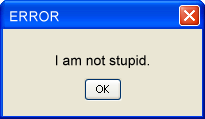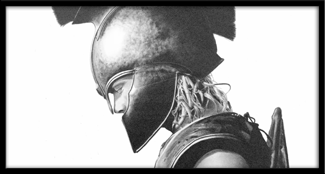
(largely intellectual even, less the movie part =D)
As far as I remember, the last time something
----------------------------------------------------
The Achilles problem was originally meant to be an
of how different things, viewed differently

That said, here's the 'answer' to the problem posted earlier.
----------------------------------------------------
BACKGROUND INFORMATION:

The Achilles and Tortoise problem, which is also
Zeno was an ancient greek philosopher, even more ancient in fact than Aristotle and Plato, the latter of whom puts some of Zeno's arguments into the mouth of Socrates* in his fourth-century BC accounts of philosophical debates.
Like many of the ancient Greeks, Zeno of Elea (a small Greek colony seventy miles from Naples) was perplexed by apparent 'contradictions' in the way we understand the world.
The 'Eleatics' suscribed to the notion that the sensory world was illusory, and opposed to a 'real' world that was permanent and unchanging. Zeno himself was a follower of Parmenides, who thought the universe was one and indivisible - an anti-commonsensical view that people sneered at them, and still do. So Zeno's paradoxes were intended to show that if we start from our commonsense view of the world, using our most scrupulous rules of thinking, we none the less end up at equally unsatisfactory conclusions.
If time is a continuous stream there can be no present, yet if time is discontinuous, a series of moments, then there can be only the present (and so no change). Similarly, if space is a smooth continuum there can be no 'here', and if space is 'discontinuous', then there is only here - and hence no motion!
Zeno's concerns here are first to show that the assumption that the world is made up of 'things' to be distinguished from other 'things' - even that most basic notion of things, atoms - can only be made at the expense of having to accept some unacceptable conclusions. For if we divide the world up into bits, we end up with it being impossible for any object to travel any distance at all, however fast it may move. And also that however slowly something moves, it somehow manages to travel an infinite distance.
In fact Zeno's paradoxes of motion have been refuted by philosophers for over 2,000 years now, with the present crop of scientific/mathematical expert explanations no exception. However, they have survived because actually, no one can explain them anyway. Inasmuch as mathematics offers solutions to the problems, it is because mathematics loftily disdains any reference to motion and time in its foundations and ceases to be rooted in the world. (Or as Einstein once wrote, in a paper entitled 'Geometry and Experience': 'as far as the propositions of mathematics refer to reality, they are not certain; and as far as they are certain, they do not refer to reality'.) For example, in maths, we can add the infinite series of one half plus one quarter plus one eighth plus... to get just one. And it seems to work. But the conclusion remains based on mathematical conventions. (Even Kurt Godel, following up Bertrand Russell's hapless attempts to establish arithmetic on firm foundations, was unable to prove everything - instead he settled for a 'Theory of Incompleteness', proving that you can't prove anything.)
The central issue remains whether reality is a continuum of infinitely small instants, or a series of discrete moments. In either case, as Zeno showed, there are problems: Achilles cannot catch the tortoise, and...
* Read about Socrates here.
----------------------------------------------------
The basic point of contention here is the fundamental question - is reality made up of a never-ending set of instants, or does it comprise of numerous discrete moments put together, much like a moving film produced by virtue of running sequential images? Sure, the clock may separate time into hours, minutes and seconds (even milliseconds, maybe), but can reality be similarly segmented?
Zeno believed in the former, that it was impossible to separate reality into different moments in time, defying most who held the view of the latter, deeming it most commonsensical. Hence Zeno devised this paradox to prove that even when holding the most commonsensical view of reality being a set of discrete (separable) moments, might yield problems. In short, common sense may not always be right after all.
Achilles and the tortoise served to prove that if reality, being viewed as a set of discrete moments, would yield conclusions that defied everyday observations. In this case, Achilles would never be able to catch up with the tortoise in theory (although in reality, Achilles would have easily won). This is similar to the idea of the sum to infinity: one half plus one quarter plus one eighth plus... would give one in theory, but in reality how accurate is this? Mathematics works on the premise that it is possible to arbitrarily separate instances from one another, rather than viewing it as a continuous set.
Hence, if you tried using Mathematics to solve the problem, you are subconsciously a suscriber of the view that the world is really made up of many instances put together like a slideshow film, except faster such that it runs coherently. You will also likely, then, find yourself stumped by the fact that Achilles could possibly never overtake the tortoise.
But that's not to say that Mathematics is entirely inaccurate, or that the world is definitely made up of a continuous set of instances which are inseparable. What this just goes to show is that sometimes, things that we may have been learning all this while might not be entirely accurate, and at some point in time we may have to rethink certain concepts.
Einstein sums this very succintly by his quote 'as far as the propositions of mathematics refer to reality, they are not certain; and as far as they are certain, they do not refer to reality'. In essence, Einstein is saying that maths (and possibly any experimental science and its branches) serve to prove only in theory, and cannot be accurately employed to determine real-life occurrences.
'If time is a continuous stream there can be no present, yet if time is discontinuous, a series of moments, then there can be only the present (and so no change). Similarly, if space is a smooth continuum there can be no 'here', and if space is 'discontinuous', then there is only here - and hence no motion!'
Of course we could go on on the debate about how there might be no such thing as the 'present' or the 'past', but I guess I shall just stop here for now!
If You STILL Didn't Get That...
SCREW PHILOSOPHY!

melvin



























|